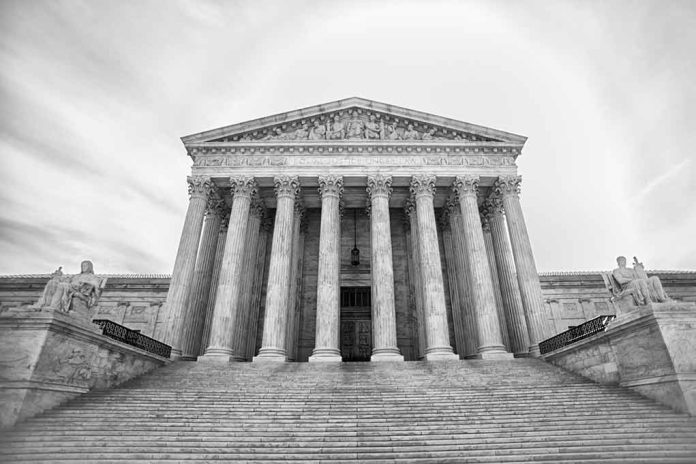
The U.S. Supreme Court has rejected Mark Meadows’ bid to move his Georgia election interference case to federal court, leaving the former Trump chief of staff to face state charges.
At a Glance
- Supreme Court denies Meadows’ request to move Georgia case to federal court
- Meadows indicted for alleged participation in scheme to keep Trump in power after 2020 election
- Case remains in Georgia state court, emphasizing separation of state and federal jurisdictions
- Four co-defendants have pleaded guilty; Trump, Meadows, and others maintain innocence
- Case is part of broader investigation involving Trump and 19 others
Supreme Court Decision Impacts Meadows’ Legal Strategy
In a significant development, the U.S. Supreme Court has declined to hear Mark Meadows’ petition to transfer his criminal case from Georgia state court to federal jurisdiction. This decision leaves the former White House chief of staff to face charges in Fulton County, where he stands accused of participating in efforts to overturn the 2020 election results in Georgia.
The Supreme Court’s rejection came without explanation or noted dissents, effectively upholding lower court rulings that the case should remain in state court. This outcome deals a blow to Meadows’ legal strategy, which sought to leverage federal protections based on his former role as a federal official.
The Supreme Court refused Tuesday to let former Trump White House chief of staff Mark Meadows move the election interference case against him in Georgia to federal court, where he would have argued he was immune from prosecution. https://t.co/aOJs45Z7XC
— PBS News (@NewsHour) November 12, 2024
Implications for the Broader Trump Legal Saga
The decision has potential ramifications for other defendants in the Georgia case, including President elect Donald Trump. It underscores the challenges faced by Trump allies in their attempts to move state-level prosecutions to federal courts, where they might have found more favorable conditions.
“A White House chief of staff facing criminal charges based on actions relating to his work for the president of the United States should not be a close call—especially now that this court has recognized that federal immunity impacts what evidence can be considered, not just what conduct can form the basis for liability” – Meadows’ attorneys
Despite this setback, Meadows’ legal team has vowed to continue asserting his innocence in state court. The case, however, remains largely on hold due to an ongoing appeals court review of potential issues surrounding Fulton County District Attorney Fani Willis.
NEW: Supreme Court rejects former Trump chief of staff Mark Meadows' appeal in Georgia election interference case:https://t.co/x49B1gKGgP
— Lawrence Hurley (@lawrencehurley) November 12, 2024
Legal Arguments and Court Decisions
Meadows had argued that his alleged misconduct occurred while performing his duties as a federal official, which he claimed should grant him certain protections and allow for the case to be heard in federal court. This argument was rejected by both a U.S. district judge and the 11th U.S. Circuit Court of Appeals before reaching the Supreme Court.
“His references to the overheated words of opinion editorials cannot suffice to demonstrate that a new era of ubiquitous prosecution of former federal officials is at hand” – government attorneys
Prosecutors countered that Meadows’ actions were not related to his official duties and that the case should remain in Georgia courts. This view has now been implicitly endorsed by the Supreme Court’s decision not to intervene.
Broader Context and Future Implications
The case against Meadows is part of a larger investigation involving Donald Trump and 18 others accused of attempting to overturn the 2020 election results in Georgia. While four individuals have already pleaded guilty, the remaining defendants, including Trump and Meadows, maintain their innocence.
This Supreme Court decision may have implications for other cases involving former federal officials, particularly those related to the events surrounding the 2020 election. It emphasizes the separation between state and federal jurisdictions and may set a precedent for how similar cases are handled in the future.
As the legal proceedings continue to unfold, the focus now returns to the Georgia state court, where Meadows and his co-defendants will face the charges brought against them. The outcome of this case could have significant political and legal ramifications, potentially shaping the narrative around the 2020 election and its aftermath for years to come.
Sources:
- Supreme Court rejects request by ex-Trump chief of staff Meadows to move Georgia case
- Supreme Court Rejects Ex-Trump Chief of Staff’s Push to Move Case
- Supreme Court refuses legal lifesaver for former Trump chief of staff
- Supreme Court Rejects Mark Meadows’ Petition, but Might Take President Trump














